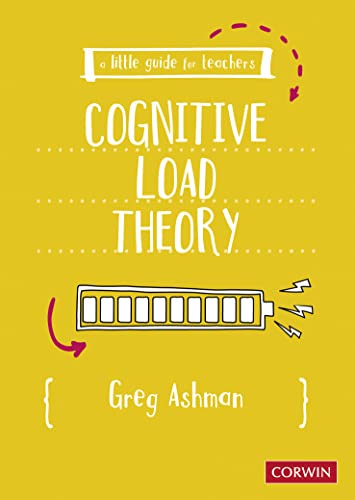A Little Guide for Teachers
Cognitive Load Theory
Greg Ashman
BOOK REVIEW

The quest for understanding how we learn is as old as humanity itself, yet in the cacophony of educational methodologies, A Little Guide for Teachers: Cognitive Load Theory by Greg Ashman stands out as a beacon of clarity. This isn't just another educational manual; it's a deep dive into the intricacies of human cognition, and it wields the power to reshape how educators approach teaching in an age drowning in information overload.
Cognitive Load Theory, the cornerstone of Ashman's exploration, reveals profound insights into the way our brains process and retain information. You'll find yourself compelled to rethink everything you assumed you knew about effective teaching strategies and student engagement. Through Ashman's lens, one learns that less can indeed be more; simplifying the load on a student's working memory can lead to astonishing improvements in comprehension and retention.
Imagine standing at the edge of an abyss-the anxiety of passing on knowledge versus the necessity of teaching it effectively. This guide equips teachers with not just knowledge but tools to traverse that chasm. Ashman's straightforward prose makes the complexities of cognitive science accessible, distilling theory into overwhelmingly practical advice. From structuring lessons that minimize cognitive overload to using assessment techniques that enhance learning, he arms educators with a battle plan against the tide of ineffective teaching.
What's particularly engaging are reader reactions that pulse with excitement or shudder with revelation. Many have noted that Ashman doesn't just present theories; he urges teachers to confront their longstanding methods and face the uncomfortable truths behind them. "This book made me question my entire teaching philosophy," one reader exclaimed, while another lamented, "Why didn't I know this sooner?" Such sentiments echo the universal struggle for better educational practices, a struggle that Ashman effortlessly connects to with every word.
Yet, as any robust discussion about education merits, not all responses have been rosy sunshine and blooming accolades. Critics have pointed out that the book's brevity could limit deeper exploration into certain topics, leaving some educators craving more depth. Others argue that while Ashman's insights are enlightening, they may not be universally applicable across all subjects and age groups. The discussions this book ignites are vital; they challenge us to reflect on the information we consume and how it translates into actionable teaching practices.
In an educational landscape that's often bogged down in bureaucracy and ever-evolving trends, Ashman serves up a refreshing dose of pragmatic wisdom. He compels you, the reader, to not just absorb his insights but to envision implementing them in your own space, forging a connection between theory and practice that few educational texts achieve.
Ultimately, A Little Guide for Teachers: Cognitive Load Theory not only shines light on the importance of cognitive load in learning but also begs you, the educator, to consider: Are you truly maximizing your students' potential? It's a radical question, one that may well transform your teaching philosophy forever. As you digest this guide, prepare for a paradigm shift that could amplify your impact on students in ways you never deemed possible. 🌟
📖 A Little Guide for Teachers: Cognitive Load Theory
✍ by Greg Ashman
🧾 88 pages
2023
#little #guide #teachers #cognitive #load #theory #greg #ashman #GregAshman